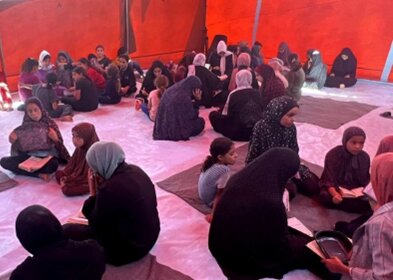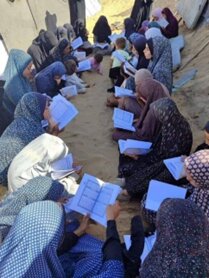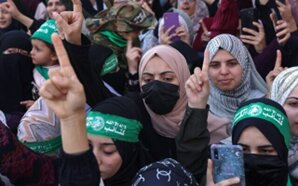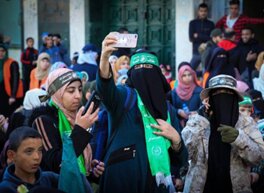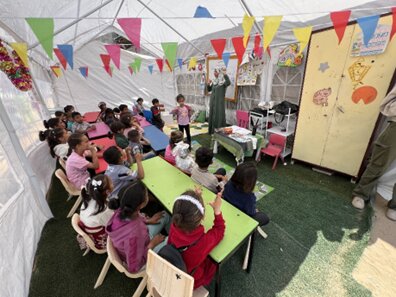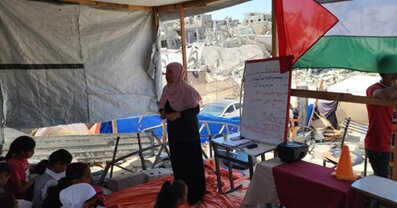Women of Gaza shatter Western cliché of “passive Muslim woman”
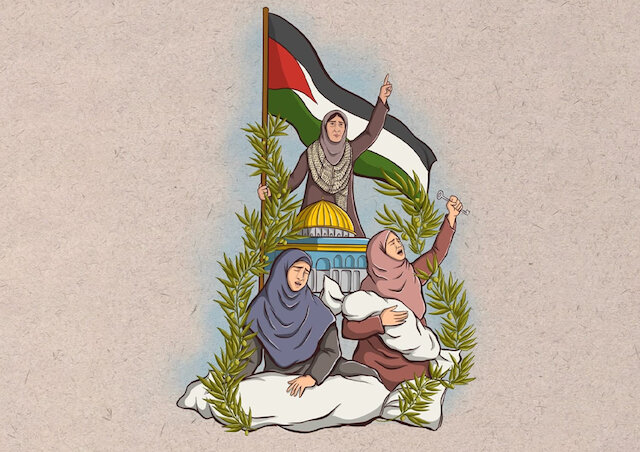
Zahra Shafei, cultural researcher
-Where do you seek refuge during airstrikes?
-In my mother’s arms.
For years, the Western world presented a narrative of Muslim women that aligned with the Western government’s ideological and geopolitical agendas. In this narrative, the Muslim woman was portrayed as disempowered, oppressed, and devoid of identity who was imprisoned in a patriarchal system and shackled by religious beliefs. This distorted caricature, by denying the agency of women in Muslim societies, served to justify interventionist policies. Gaza, however, is where this cliché crumbles. It is where Muslim women not only stand against the brutal aggressions and genocide of the Zionist regime but also challenge the demeaning narratives of Western powers.
Over the past 15 months, these women have become a symbol of resilience, steadfastness, and faith in the truth.
During the bloody war imposed on Gaza by the Zionist regime after October 7, just as throughout previous years of occupation, Gaza’s Muslim women have consistently borne witness to the truth of resistance in the chaotic arena of suffering and destruction and amidst relentless hardship. The courage of these women was not merely a response to bullets and bombs; it was an undeniable statement against lies, distortions, and narratives that depicted them as weak, defeated, and hidden in the shadows.
The dominant narrative in the West is deeply rooted in orientalist fantasies that seek to define Muslim women as victims of perpetual oppression. According to this cliché, these women are devoid of any agency and are suppressed by men in a religious society. Such depictions pave the way for war propaganda and create a pretext for colonial interventions under the guise of “liberation.” The bitter irony lies in the fact that this so-called liberation invariably arrives with bombs, sanctions, destruction, and the devastation of nations.
Nevertheless, the reality of Gaza’s women is that they are the pillars of resistance and survival of Gaza—whether during airstrikes by shielding their children with their own bodies, or in the midst of famine and ruin by acting as caregivers, nurses, and teachers to convey messages of hope and solace to their suffering communities, or when they cried out “Allahu Akbar“ and “Hasbi Allah“ after the loss of their beloved ones, which was a testament to their unwavering faith and patience, or when they were put next to their brothers and grieving spouses who are always mischaracterized in Western narratives as oppressive and violent in their anti-Islamic caricatures and unfair judgments, it was this hope and calm that nurtured the dreams of Gaza’s children about freedom, destruction of the occupier, rebuilding of their homes, and continuation of life.
These women, who have endured the pain of the greatest massacre of children in history, continue to declare with unparalleled courage: “We will be patient, and we will persevere as long as the Resistance leaders ask us to.”
Faith was the fundamental source of strength for the women of Gaza. Faith gave them solidarity and purpose.
Memorizing and reciting the Qur’an in groups, organizing Qur’an classes in refugee camps or destroyed homes, whispering prayers and invocations during bombings, and gathering in makeshift mosques set up in tents fortified their spirits. Islamic values such as patience in the face of hardship and resistance against oppression empowered Gaza’s women to endure the violence of occupation and withstand the psychological toll of marginalization. As Imam Khamenei has stated, through this very patience, the women and people of Gaza “have been able to stir the human conscience.”
Western media will never acknowledge the profound connection between faith and human resilience. They continue to deny the agency of Muslim women within their religious and cultural frameworks, ignoring the pivotal role these women play in their societies. This is because such an acknowledgment would expose the schemes behind the media’s narrative of the “Western savior.” The hypocrisy of Western feminism is evident in its selective support for Muslim women’s rights, backing them only when it aligns with colonial agendas.
The Muslim woman of Gaza, when she narrates, supports armed resistance against the occupying regime, raises her child to embrace jihad and struggle, sends her husband off with Qur’anic verses about jihad, takes up arms herself, or calls for freedom from the river to the sea, she upends the colonial equations of feminism. Feminism not only does not approve of such steadfastness and resilience but condemns it as extremism, the result of brainwashing, or evidence of violence. In the West’s colonial standards, a woman who adopts secular and Western ideals is deemed more valuable than a religious woman defending her family, homeland, and faith. The women of Gaza challenge this view every day and every moment, proving that human values are not to be measured by Eurocentric standards.
The women of Gaza are symbols of triumph over various forms of oppression. Despite the Zionist regime’s attempts to dehumanize them through siege, displacement, and massacres, they remain steadfast. And this steadfastness is not passive but an active movement: they resist, rebuild, and nurture hope in hearts. This is the embodiment of victory—both against the enemy and against Western narratives.
For years, the West has defined Muslim women as submissive, oppressed, and weak. Yet, it is the women of Gaza who dismantle this illusion. By holding onto their Islamic identity, they exhibit a level of strength, independence, and unshakable faith in their religion and homeland that defies superficial perceptions. They have proven that their ideals and identity cannot be confined to orientalist clichés or frameworks defined under Western standards. They have written their own story—a story of faith, dignity, and unyielding resistance.
The struggle of Gaza’s women reminds us of the power of narratives. In a world where the media serve as a tool of colonial powers, amplifying voices that challenge the status quo is essential. The example of Gaza’s women inspires all who resist oppressors and fight for human dignity.
As the women of Gaza participate in marches and gatherings during the current ceasefire to honor their mujahideen and fighters, they shatter the lies that have been told about them. It is high time for the world to get to know these women as they truly are, not as victims awaiting a Western savior, but as faithful, dignified heroines of their extraordinary story.
| © | KHAMENEI.IR |


